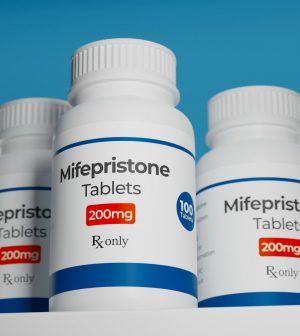- Could Your Grocery Store Meat Be Causing Recurring UTIs?
- Are You Making This Expensive Thermostat Error This Winter?
- Recognizing the Signs of Hypothyroidism
- 10 Strategies to Overcome Insomnia
- Could Artificial Sweeteners Be Aging the Brain Faster?
- Techniques for Soothing Your Nervous System
- Does the Water in Your House Smell Funny? Here’s Why
- Can a Daily Dose of Apple Cider Vinegar Actually Aid Weight Loss?
- 6 Health Beverages That Can Actually Spike Your Blood Sugar
- Treatment Options for Social Anxiety Disorder
Louisiana Votes to Make Abortion Pills Controlled Substances

Louisiana has become the first state to pass a law that designates abortion pills as dangerous controlled substances.
Once Gov. Jeff Landry signs the bill into law, as he is expected to do, possession of the drugs mifepristone and misoprostol without a prescription would be a crime punishable with possible fines and jail time.
Louisiana already has a near-total abortion ban, so the medications, which are also used for miscarriages and ulcers, are only available in that state under limited circumstances.
Medical experts warned of the bill’s dangers.
“What it’s going to do is make it harder to use these drugs safely and legally,” Dr. Jennifer Avegno, director of the New Orleans Health Department and organizer of a letter opposing the bill, told the New York Times. “It’s going to create confusion, fear, barriers to using these drugs for all of their non-abortion indications.”
But Republicans and the anti-abortion groups have claimed that abortion rights groups of creating unnecessary fear over the legislation, the Times reported.
“This legislation does NOT prohibit these drugs from being prescribed and dispensed in Louisiana for legal and legitimate reasons,” State Attorney General Liz Murrill posted on social media.
Abortion opponents have argued that abortion pills are unsafe, making that claim in a lawsuit before the U.S. Supreme Court that seeks to curtail access to mifepristone, the first pill in the two-drug medication abortion regimen that now accounts for nearly two-thirds of abortions in the United States.
Many patients who live in Louisiana or other states with abortion bans have traveled to states where abortion remains legal to get medical care, or they have received prescriptions and pills from doctors and nurses in other states under shield laws. Those methods of getting abortions are unlikely to be affected by the new bill, the Times reported.
David Cohen, a law professor at Drexel University in Philadelphia, told the Times that a relatively small number of people might be vulnerable to penalties under the bill, including volunteers who help provide nonprescription pills to some communities and women who order abortion pills as protection in case they get pregnant.
“It may make some people think twice, and it may expose some people to criminal prosecution who right now are not exposed,” he said. But, “this is not going to stop people in Louisiana from getting and using abortion pills,” he noted.
Still, Michelle Erenberg, executive director of Lift Louisiana, a reproductive rights organization, said abortion rights groups would explore a legal challenge to the bill.
“I definitely have concerns about this being replicated in other states,” she told the Times.
More information
KFF has more on the abortion pill.
SOURCES: New York Times
Source: HealthDay
Copyright © 2026 HealthDay. All rights reserved.










